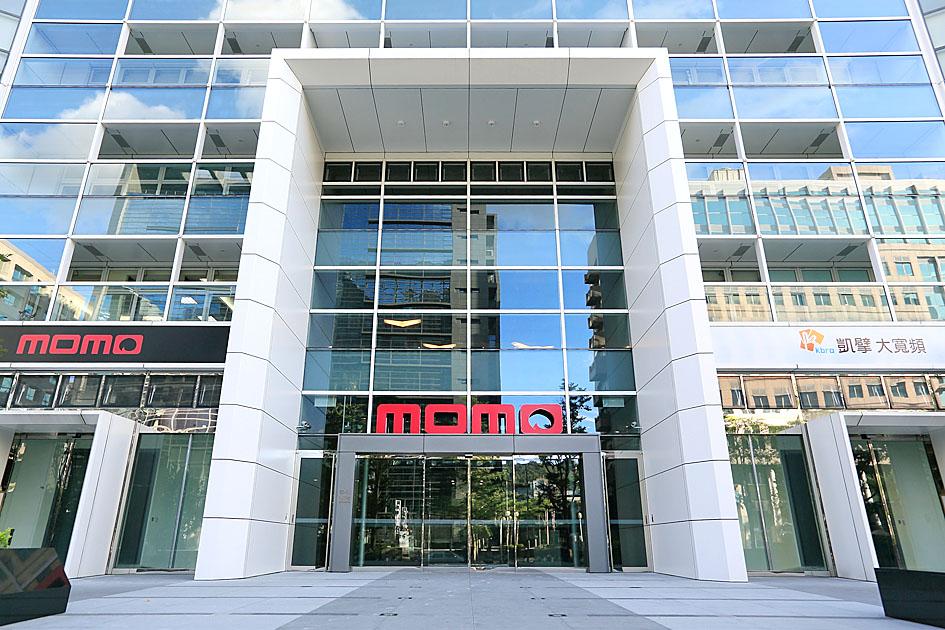E-commerce operator Momo.com Inc (富邦媒體) yesterday posted record revenue of NT$6.48 billion (US$227.5 million) for last month, up 25.6 percent year-on-year on the back of a “Double 12” shopping event that saw sales increase 36 percent year-on-year.
Revenue was also boosted by robust sales of electric heaters, dehumidifiers and winter clothing during a spate of cold fronts, the company said in a statement.
Sales of information technology products and home appliances grew 35 percent year-on-year last month, and those of health and beauty-related products increased 29 percent, it said.

Photo: Vanessa Cho, Taipei Times
The strong performance saw fourth-quarter revenue grow 30 percent year-on-year to NT$20.67 billion and boosted full-year revenue to NT$67.2 billion, up 29.6 percent, it added.
Local rival PChome Online Inc (網路家庭) on Sunday posted revenue of NT$4.17 billion for last month, up 13.66 percent year-on-year.
Purchases for Christmas, end-of-year sales, seasonal demand for consumer electronics and sales of New Year dishes supported the performance, the company said in a statement.
Meanwhile, downloads of the company’s mobile app exceeded 5 million and its number of new members increased by 50 percent year-on-year, suggesting that consumers are continuing to shift to online shopping, it said.
PChome said that electric appliances, such as heated blankets and electric heaters, were particularly popular last month, while sales of board games, mahjong and interactive games also increased, as more people celebrated New Year’s Eve at home due to the COVID-19 pandemic.
Corporate purchases of gifts for employees’ year-end parties significantly boosted shipments of consumer electronics, information and communication products, and gaming products, it added.
PChome’s cumulative revenue for last year was a record-high NT$43.87 billion, up 12.82 percent year-on-year, company data showed.

TECH BOOST: New TSMC wafer fabs in Arizona are to dramatically improve US advanced chip production, a report by market research firm TrendForce said With Taiwan Semiconductor Manufacturing Co (TSMC, 台積電) pouring large funds into Arizona, the US is expected to see an improvement in its status to become the second-largest maker of advanced semiconductors in 2027, Taipei-based market researcher TrendForce Corp (集邦科技) said in a report last week. TrendForce estimates the US would account for a 21 percent share in the global advanced integrated circuit (IC) production market by 2027, sharply up from the current 9 percent, as TSMC is investing US$65 billion to build three wafer fabs in Arizona, the report said. TrendForce defined the advanced chipmaking processes as the 7-nanometer process or more

China’s Huawei Technologies Co (華為) plans to start mass-producing its most advanced artificial intelligence (AI) chip in the first quarter of next year, even as it struggles to make enough chips due to US restrictions, two people familiar with the matter said. The telecoms conglomerate has sent samples of the Ascend 910C — its newest chip, meant to rival those made by US chipmaker Nvidia Corp — to some technology firms and started taking orders, the sources told Reuters. The 910C is being made by top Chinese contract chipmaker Semiconductor Manufacturing International Corp (SMIC, 中芯) on its N+2 process, but a lack

NVIDIA PLATFORM: Hon Hai’s Mexican facility is to begin production early next year and a Taiwan site is to enter production next month, Nvidia wrote on its blog Hon Hai Precision Industry Co (鴻海精密), the world’s biggest electronics manufacturer, yesterday said it is expanding production capacity of artificial intelligence (AI) servers based on Nvidia Corp’s Blackwell chips in Taiwan, the US and Mexico to cope with rising demand. Hon Hai’s new AI-enabled factories are to use Nvidia’s Omnivores platform to create 3D digital twins to plan and simulate automated production lines at a factory in Hsinchu, the company said in a statement. Nvidia’s Omnivores platform is for developing industrial AI simulation applications and helps bring facilities online faster. Hon Hai’s Mexican facility is to begin production early next year and the

Who would not want a social media audience that grows without new content? During the three years she paused production of her short do-it-yourself (DIY) farmer’s lifestyle videos, Chinese vlogger Li Ziqi (李子柒), 34, has seen her YouTube subscribers increase to 20.2 million from about 14 million. While YouTube is banned in China, her fan base there — although not the size of YouTube’s MrBeast, who has 330 million subscribers — is close to 100 million across the country’s social media platforms Douyin (抖音), Sina Weibo (新浪微博) and Xiaohongshu (小紅書). When Li finally released new videos last week — ending what has